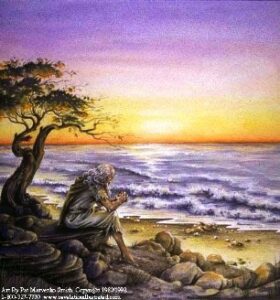REVELATION (Lord Jesus Christ is ultimate victor)
Date: AD 90 -95
Author: The Apostle John
Location: Patmos.
To whom: To the 7-churches in Asia and all believers everywhere.
Purpose: To reveal the full identity of Jesus Christ and give warning and hope to all believers at large.

Apostle John – author of Revelation
Key verse: “Blessed is the one who reads the words of this prophecy and blessed are those who hear it and take to heart what is written in it, because the time is near” (1:3)
Uniqueness of the book: The book of Revelation reveals the end of human history, including the final political set of the world, the career of Antichrist and the final battle of Armageddon. Revelation contains full of prophecy. Prophecy is both “forthtelling” (a word of God about the present situation) and “foretelling” (a word of God about the future). Revelation is both, but the greater part being the predictions of events yet to happen.
Background:
The word translated “revelation” simply means “unveiling.” In other words, Revelation is an open book in which God reveals His plans and purposes to His church. When Daniel finished writing his prophecy, he was instructed to “shut up the words, and seal the book” (Dan. 12:4); but John was given opposite instructions: “Seal not the sayings of the prophecy of this book” (Chap. 22:10).
John’s prophecy is primarily the revelation of Jesus Christ, not the revelation of future events.

John sitting beside Aegean sea
John wrote Revelation about A.D. 95, during the reign of the Roman emperor Titus Flavius Domitian. The emperor had demanded that he be worshiped as “Lord and God,” and the refusal of the Christians to obey his edict led to severe persecution. Tradition says that it was Domitian who sent John to the Isle of Patmos, a Roman penal colony off the coast of Asia Minor.
This being the location of John’s exile, perhaps it is not surprising that the word sea is found twenty-six times in his book. John was an older man and perhaps the only surviving apostle at that time. He had not yet been banished to the island of Patmos, where he would live in exile. As an eyewitness of Christ, he wrote authoritatively to give this new generation of believers assurance and confidence in God and in their faith.